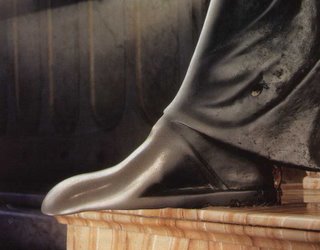In a time-honored monastic custom we will "ring out" one last Alleluia tonight after Evening Prayer. It will be the last one we sing until the Easter Vigil. There is something very significant about abstaining from certain rituals during the holy season of Lent. We "fast" -- in a sense -- from the Alleluia and the Gloria; we refrain from decorating the chapel or choir with flowers. Our senses are deprived of familiar and comfortable signs of celebration and consolation.
Our Lenten journey is a symbol of our Christian pilgrimage. Much like St. Peter's statement in today's Gospel, we are called to leave behind many things if we are to follow Christ. Like the rituals that we leave behind during Lent, however, all that we give up to follow the Lord is given back to us. The Alleluias are sung again, the flowers, decorations, festive music, etc., are given to us again and again during the Octave of Easter: a week of Easter Sundays. And so it is with all that we leave behind when we follow Christ; it is returned to us in ways we could never have imagined -- in this life and in the life to come.
As we bid farewell to the comforts of Ordinary Time and begin this most sacred of seasons, let us ask the Lord for the grace to lay aside all that separates us from Him. May all we undertake or offer up be pleasing in His sight and may its fruit be the charity with which we treat our neighbors.
"These forty days symbolize the life of the Christian, of each one of us. If we do not struggle we shall not be victorious . . . . And let us not entertain the vain hope of being saints in three months! Let us also shun both spiritual avarice and the ambition which occasions so much disorder in our hearts. May God be blessed. Amen."
St. Francis de Sales







